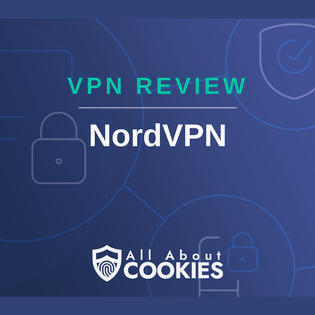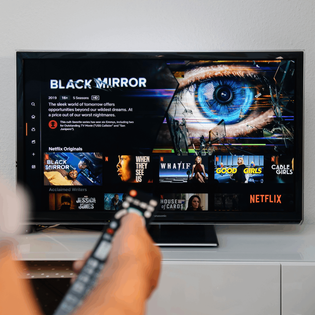Advertiser Disclosure
All About Cookies is an independent, advertising-supported website. Some of the offers that appear on this site are from third-party advertisers from which All About Cookies receives compensation. This compensation may impact how and where products appear on this site (including, for example, the order in which they appear).
All About Cookies does not include all financial or credit offers that might be available to consumers nor do we include all companies or all available products. Information is accurate as of the publishing date and has not been provided or endorsed by the advertiser.
Editorial Policy
The All About Cookies editorial team strives to provide accurate, in-depth information and reviews to help you, our reader, make online privacy decisions with confidence. Here's what you can expect from us:
- All About Cookies makes money when you click the links on our site to some of the products and offers that we mention. These partnerships do not influence our opinions or recommendations. Read more about how we make money.
- Partners are not able to review or request changes to our content except for compliance reasons.
- We aim to make sure everything on our site is up-to-date and accurate as of the publishing date, but we cannot guarantee we haven't missed something. It's your responsibility to double-check all information before making any decision. If you spot something that looks wrong, please let us know.
Best for Affordability
-
VPN offering fast internet speeds and strict no-logs policy
-
Unblocks Netflix and other streaming services
-
Antivirus and dedicated IP address cost extra
Best for Ultimate Privacy
-
Easy to use
-
A strict no-logs policy that’s been tested in court
-
More expensive than NordVPN, Surfshark, and CyberGhost
In the intricate universe of virtual private networks (VPNs), Proton VPN and PIA (Private Internet Access) are both notable for their strong security, privacy features, and commitment to privacy. Both VPN services offer competitive pricing, but only Proton VPN offers a free plan.
Even so, PIA may offer more value with unlimited simultaneous connections compared to Proton’s 10, and PIA also offers 24/7 live chat support where Proton VPN does not.
In our review, we’ll cover the details of each VPN's offerings in terms of privacy and security such as AES-256 encryption and VPN protocols. We’ll also discuss their compatibility with a wide range of platforms, their no-logs policies, pricing plans, and much more to help you decide between Proton VPN and PIA. Let’s dive in, shall we?
PIA vs. Proton VPN: prices
PIA vs. Proton VPN: features
PIA vs. Proton VPN: internet speeds
PIA vs. Proton VPN: compatibility and ease of use
PIA vs. Proton VPN: customer service
PIA vs. Proton VPN FAQs
PIA vs. Proton VPN: which is better?
Private Internet Access vs. Proton VPN at a glance
If you're cost-conscious, PIA is the winner with its unbeatable low rates, although Proton VPN does throw in a free, but basic, plan. PIA trumps with unlimited connections, while Proton VPN caps you at 10 simultaneous connections.
PIA also excels in customer service, which is available around the clock, and gets a thumbs up for more streaming platform access.
The main disparity between these two VPN providers? PIA calls the U.S.A. home (the U.S. is a member of the Five Eyes intelligence-sharing alliance), while Proton VPN hails from privacy-friendly Switzerland.
- Private Internet Access: Best affordable, budget-friendly VPN
- Proton VPN: Best for ultimate privacy and security
How does PIA vs. Proton VPN compare?
 Private Internet Access Our Pick
|
 Proton VPN Proton VPN
|
|
| Price | $2.03–$11.99/mo | $4.99–$9.99/mo |
| Max # of connected devices | Unlimited | 10 |
| No-logs policy | No logs | No logs |
| Headquarters | United States | Switzerland |
| # of servers | Servers in 84 countries + 50 U.S. states | 2,900+ |
| VPN protocol | WireGuard, OpenVPN, IPsec | WireGuard, OpenVPN, IKEv2/IPsec |
| Streaming support | Yes — Netflix, Amazon Prime Video, HBO Max, Disney+, and more | Yes — Netflix, Hulu, BBC iPlayer |
| 24/7 customer support | ||
| Compatibility | Windows, macOS, Linux, Android, iOS, Chrome, Opera, Firefox | Windows, macOS, Linux, Android, iOS, Chrome, Firefox |
| Learn more | Get PIA
Read PIA Review |
Get Proton VPN
Read Proton VPN Review |
When you compare the cost, PIA edges out Proton VPN, coming in at a slightly more affordable $2.03/mo versus Proton's Free charge. As far as server locations go, PIA hasn't disclosed the exact number, but they've spread their coverage across 84 nations. Proton, on the other hand, is open about its server tally, with over 2,900 spread across 65 countries.
Both PIA and Proton VPN pride themselves on their no-logs policy, providing access to top streaming services such as Netflix and BBC iPlayer.
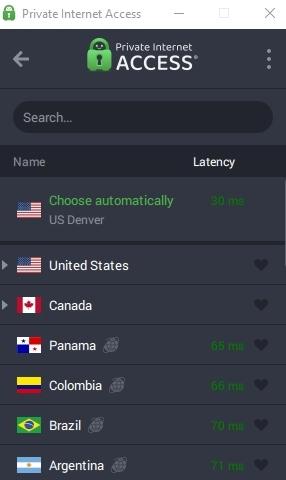
However, Proton VPN does seem to outshine PIA a bit in terms of its security features. It boasts its Secure Core service, which provides multi-hop connections and acts akin to a double VPN. It routes network traffic through servers in privacy-friendly nations such as Switzerland and Iceland, obscuring your location and adding an extra layer of privacy.
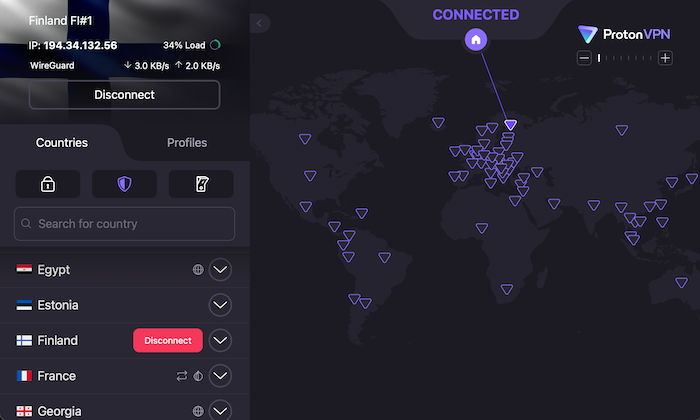
Proton VPN’s paid plan also gets you access to its Plus servers, which are optimized for streaming and torrenting and can also help you route your internet traffic through Tor.
PIA vs. Proton VPN: prices
 Private Internet Access Our Pick
|
 Proton VPN Proton VPN
|
|
| Price range | $2.03–$11.99/mo | $4.99–$9.99/mo |
| Best value plan | 3 years + 3 months plan for $2.03/mo | 2-year plan for $4.99/mo |
| Money-back guarantee | Yes — 30 days | Yes — 30 days |
| Learn more | Get PIA
Read PIA Review |
Get Proton VPN
Read Proton VPN Review |
Cost is often a significant factor when deciding which VPN to choose. As a result, most people opt to save money on a VPN by signing up for a longer subscription. PIA offers the most affordable pricing plans of the two, but Proton VPN’s one-year and two-year plans knock its monthly cost down significantly.
PIA offers a broad price range, with monthly plans falling between $2.03–$11.99/mo. This flexibility is augmented by the cost-effective three-year-plus-three-months plan, priced at a modest $2.03/mo, a deal that's hard to beat.
On the other hand, Proton VPN, hailing from privacy-friendly Switzerland, offers plans from $4.99–$9.99/mo. Of particular interest is the two-year plan, a savvy choice at just $4.99/mo. Additionally, Proton VPN offers a free version — but you should know it comes with limited server locations and features.
Rest assured, both VPN services cater to the cautious spender with a 30-day money-back guarantee, offering an added layer of financial security as you explore what these VPN apps have to offer.
PIA vs. Proton VPN: features
| Feature |
 Private Internet Access Our Pick
|
 Proton VPN Proton VPN
|
| Number of servers | Servers in 84 countries + 50 U.S. states | 2,900+ servers in 65+ countries |
| No-logs policy | No logs | No logs |
| VPN headquarters | United States | Switzerland |
| Encryption | AES 256-bit | AES 256-bit |
| VPN protocol | WireGuard, OpenVPN, IPsec | WireGuard, OpenVPN, IKEv2/IPsec |
| Kill switch | ||
| Split tunneling | Yes, Windows and Android only | |
| Streaming support | Yes — Netflix, Amazon Prime Video, HBO Max, Disney+, and more | Yes — Netflix, Hulu, BBC iPlayer |
| Torrenting support | ||
| Learn more | Get PIA
Read PIA Review |
Get Proton VPN
Read Proton VPN Review |
At a glance, PIA and Proton VPN have a lot in common when it comes to features. Both of them have various server locations worldwide, utilize bank-grade encryption (AES 256-bit), and implement secure VPN protocols, namely WireGuard, OpenVPN, and IKEv2/IPSec. They also both offer dedicated IP addresses — though Proton VPN’s is available only to business users.
Additionally, both VPN services' no-logs policies have undergone audits by outside vendors Deloitte and Securitum, and both passed. They both support torrenting as well as streaming, so you can watch popular shows on Netflix.
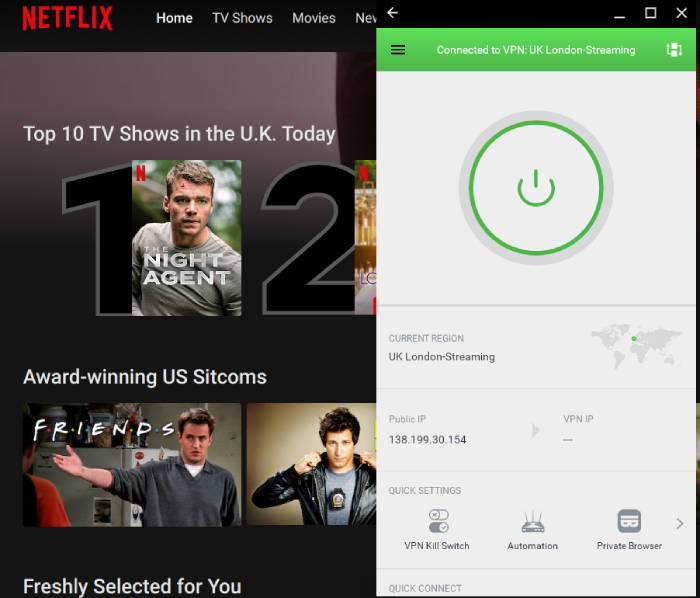
Private Internet Access successfully unblocked multiple Netflix libraries during our testing.
Aside from essential VPN features like a kill switch or split tunneling, they both offer multi-hop capabilities that route traffic through multiple servers to obscure your identity and online activities. PIA lets you connect to multi-hop servers to do this, and Proton VPN’s Secure Core feature delivers multi-hop functions.
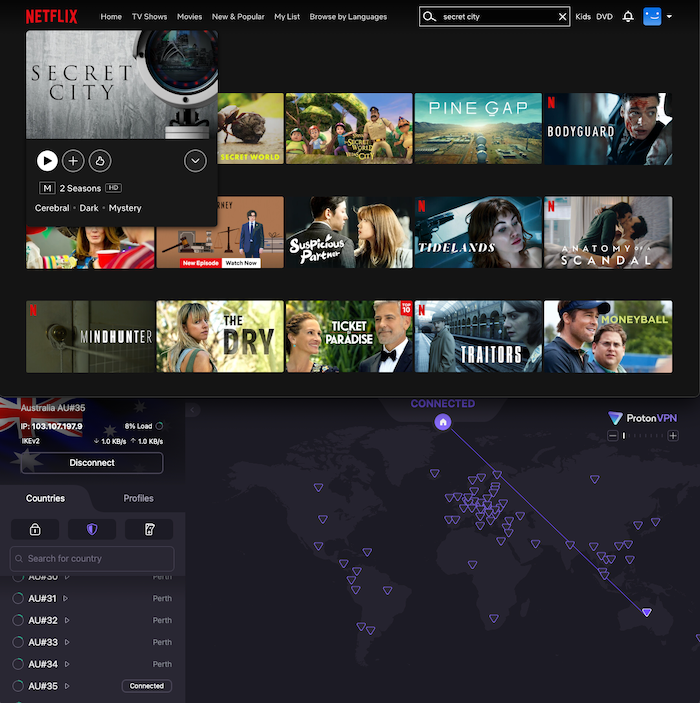
Proton VPN also unblocked multiple Netflix libraries, including Australia.
The main difference between the two is where they’re headquartered. Proton VPN is based in Switzerland, where privacy laws are taken seriously. PIA, on the other hand, is based in the U.S., which is a member of the intelligence-sharing alliance Five Eyes and could raise privacy concerns for some.
PIA vs. Proton VPN: streaming support
| Platform |

|

|
| Netflix | ||
| Amazon Prime Video | ||
| Hulu | ||
| BBC iPlayer | ||
| Disney+ | ||
| HBO Max | ||
| Learn more | Read PIA Review | Read Proton VPN Review |
When it comes to the best streaming VPNs, there's a clear distinction between PIA and Proton VPN. Both excel at unblocking Netflix and Hulu, as well as BBC iPlayer and others, providing you with a wealth of content beyond your regional limits.
We did find that PIA had trouble unblocking Hulu in our tests, but this could change. Streaming platforms and VPNs are in a constant battle to outdo each other, and a streaming service that works one day may detect your VPN and deny access the next. If this happens, we recommend trying a different VPN server to see if that helps.
PIA vs. Proton VPN: internet speeds
During our speed evaluation of PIA and Proton VPN, we aimed to gauge how each VPN affected connection speeds. Speed tests were conducted from our testing location in Los Angeles, CA, and we connected to server locations in the United States, U.K., Australia, and Canada. The tests were performed using a 2017 MacBook Pro laptop running the latest macOS version and a high-speed fiber internet connection.
PIA vs. Proton VPN speed test results
| Server location |

|

|
| US | 6% slower | 6% faster |
| Canada | 2% slower | 6% faster |
| UK | 5% slower | 9% slower |
| AU | 21% slower | 17% slower |
| Learn more | Get PIA
Read PIA Review |
Get Proton VPN
Read Proton VPN Review |
Analyzing our test outcomes, it's clear that when it comes to download speeds, Proton VPN demonstrated speedier performance with U.S. and Canadian servers, but it lagged with U.K. and Australian servers. PIA had slightly slower speeds than our baseline speeds when not connected to a VPN.
Unfortunately, when it comes to latency, both VPNs performed poorly, although Proton VPN managed to drop its latency by 50% while connected to a U.S. server location, which is much better than the latency performance for both VPNs when they connected to servers in Canada, U.K., and Australia.
Latency, or "ping," signifies how long data takes to journey from one location to another. This means latency plays a crucial role in seamless online activities, particularly those in real-time like online gaming or video chats. The rule of thumb is lower latency equals better online performance.
It's quite common to observe a bit of latency increase while using a VPN because your data takes a more circuitous route, hitting the VPN server before reaching its ultimate destination. And if that VPN server is located across the world in, say, Australia, you can expect to see higher latency.
PIA vs. Proton VPN latency comparison
| Server location | PIA | Proton VPN |
| US | 258% worse | 50% worse |
| Canada | 333% worse | 340% worse |
| UK | 983% worse | 1,160% worse |
| AU | 1,492% worse | 1,760% worse |
PIA vs. Proton VPN: compatibility and ease of use
| PIA | Proton VPN | |
| Windows | ||
| macOS | ||
| Android | ||
| iOS | ||
| Linux | ||
| Router | ||
| Smart devices |
Regarding device compatibility, both PIA and Proton VPN match stride for stride. They support an extensive array of devices and operating systems, proving both choices to be equally viable for users with multiple devices.
When it comes to the user interface, PIA presents a design that is both intuitive and easy to navigate, ideal for those dipping their toes into the VPN realm. Proton VPN also delivers a simple and user-friendly interface that is easy to navigate in a non-intimidating manner for those not so technologically inclined. Consequently, whether your choice falls on PIA or Proton VPN, each ensures an enjoyable user experience with comprehensive compatibility.
PIA vs. Proton VPN: customer service
 Private Internet Access Our Pick
|
 Proton VPN |
|
| 24/7 live chat | No, but chat is available | |
| Phone | ||
| Support forums | ||
| Online guides |
When it comes to customer support, Private Internet Access shines by offering a 24/7 live chat. This on-demand service can be a lifesaver during unexpected technical issues, ensuring that you aren't left in the dark when you need help the most.
On the other hand, while Proton VPN's live chat doesn't operate around the clock, it still offers reliable customer service, particularly with its prompt email responses. Moreover, both Proton VPN and PIA offer a wealth of online guides, giving you a valuable toolkit for troubleshooting common issues on your own.
Private Internet Access vs. Proton VPN: payment options
PIA and Proton VPN accept various payment options. However, PIA offers an extra cloak of anonymity by accepting bitcoin, ethereum, and litecoin through Bitpay when you sign-up for an account. On the other hand, Proton VPN only lets you use Bitcoin to purchase account credits after you’ve signed up for an account with another payment option.
Although Proton VPN doesn’t accept cryptocurrency at first, we applaud its use of 3D Secure for major credit cards to protect your payments. 3D Secure provides 2FA for every purchase you’ve made, adding another layer of protection.
Private Internet Access payment options
- Major credit cards (Visa, Mastercard, Amex, Discover)
- PayPal
- Amazon Pay
- Cryptocurrencies through Bitpay (bitcoin, ethereum, litecoin)
Proton VPN payment options
- Visa Secure
- Mastercard SecureCode
- Discover
- ProtectBuy
- American Express Safekey
- PayPal
PIA vs. Proton VPN FAQs
Is there a better VPN than PIA?
While PIA is a highly-rated choice with impressive security features and affordable pricing, you may find other VPNs like ExpressVPN more suitable, especially for speed considerations and accessing a wider network of over 3,000 servers worldwide.
Can I trust PIA VPN?
Indeed, PIA VPN has earned a reputation for its robust security measures and adherence to a verified no-logs policy. However, it’s based in the U.S., which may cause some privacy concerns.
What are the disadvantages of Proton VPN?
Despite its strong encryption and Swiss-based operations, Proton VPN's limitations lie in its restricted features in its free version and its limited support of simultaneous connections. Proton VPN caps at 10 devices, while PIA supports unlimited connections. Learn more in our Proton VPN review.
Does Netflix block Proton VPN?
Some Proton VPN servers can bypass Netflix's geo-restrictions. However, since VPN IP addresses are routinely blocked by Netflix, it can be hit-or-miss.
PIA vs. Proton VPN: which is better?
PIA and Proton VPN offer solid features for security and privacy. These include bank-grade encryption, secure VPN protocols, a kill switch, and split tunneling, not to mention the sophisticated multi-hop capabilities designed to mask your whereabouts and amplify your anonymity. They both also have no-logs policies that were thoroughly vetted by independent third-party audits. Plus, they both offer torrenting support and allow access to popular streaming platforms.
The fine lines that separate the VPNs are these: PIA provides 24/7 live chat support, whereas Proton VPN provides live chat support during business hours. But while PIA’s plans are cheap, Proton VPN goes a step further by introducing a free, limited version for those who cannot afford to dig deeply in their pockets. Also, PIA supports unlimited connections, while Proton VPN only supports 10. Finally, PIA is based in the U.S.A. (a member of the Five Eyes), while Proton VPN is in privacy-friendly Switzerland.
It’s a real pickle to choose one over the other. But given the choice, we'd gravitate toward PIA for its cost-effective, feature-rich plans and toward Proton VPN for its unwavering dedication to security and privacy.
PIA vs. Proton VPN alternatives
Below is a quick overview of the best VPNs available as alternatives.
- ExpressVPN: ExpressVPN delivers fast speeds, high-grade security, and wide streaming access, employing 256-bit encryption, innovative advanced security features, and a global server network for accessing streaming content.
Get ExpressVPN | Read Our ExpressVPN Review
- NordVPN: NordVPN has a penchant for rapid speeds, offers a large server network, provides military-grade encryption, and has a secure proprietary VPN protocol (NordLynx built on WireGuard). Plus, with its ability to unblock most geo-restricted content, it is a force to be reckoned with.
Get NordVPN | Read Our NordVPN Review
- Surfshark: Surfshark ensures strong security with affordable pricing plans that help you save money on a VPN, complemented by a strict no-logs policy and support for simultaneous connections on an unlimited number of devices. It is an all-in-one solution for those on a budget or anyone who likes to save extra dough in their pockets.
-
VPN offering fast internet speeds and strict no-logs policy
-
Unblocks Netflix and other streaming services
-
Antivirus and dedicated IP address cost extra

